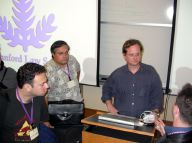 Click to view additional Bloggercon photos.
Click to view additional Bloggercon photos.
Larry Lessig opened Bloggercon with a useful statement:
In normal times, people come to univerisities to learn things, these are extraordinary times: Universities (such as) Chicago, Harvard, Northwestern don’t have a clue – we need to go out and find things, bring people here who are doing interesting things. (I’m paraphrasing)
I had the great pleasure of participating in his lively Law section. Lessig provided a very useful overview, including a color coded slide of the current copyright morass and mentioned Creative Commons as an alternative universe for creative folks. He also mentioned that our “fair use” rights from the RIAA/MPAA perspective generally means that we have the right to hire a lawyer (!). The session also included some very informative comments from Hummer Winblad’s Hank Berry, an active participant in the Washington lobbying wars, including the recent induce act madness.
Berry mentioned the following points (check out the video (127MB – about 60% of the session) and listen to the forthcoming mp3’s for more details)
- Utah Senator Orrin Hatch visited Microsoft 3 weeks before he, along with Vermont Democrat Pat Leahy introduced the induce act (I find this rather ironic as Hatch was a proponent of breaking up Microsoft).
- Yahoo evidently refused to discuss the bill, which killed it. Hank said that this was the first time a Silicon Valley firm refused to deal with the RIAA/MPAA folks (kudos to yahoo)
- We also discussed the WinTel “trusted computing” – an oxymoron – scheme. A number of folks expressed concerns that Microsoft and Apple could pull the plug on MP3 support via a software update and thereby kill fair mp3 use…..
Lots of great stuff at Bloggercon. Kudos to Dave Winer for making it happen.
Later: I asked Larry: how do you like the west or east coast approach (He was at Harvard before)? “This is better, people talk…” (vis a vis harvard, nw, chicago, etc.)
9.4MB MP3 | 127MB Quicktime


